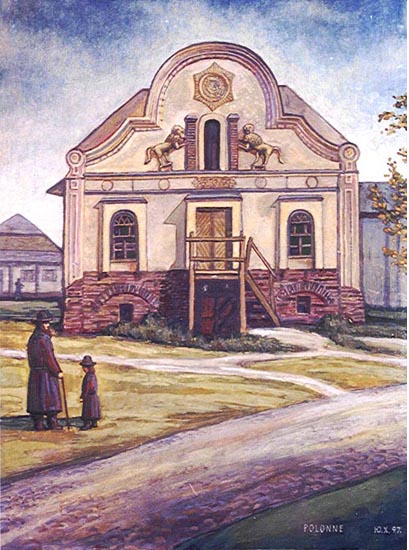
Last updated on 6/7/2025 rlb
Polonnoye, Ukraine
Home
History
Maps
Images
Memoirs
Cemetery
References
Genealogy Resources
Other Links

Polonnoye Synagogue,
Pre-WWII
Photo of painting by
Isakowitz Jurij (Yuriy) Khodorkovsky
1996
Donated by Eric Himmelfarb
JewishGen Homepage
JewishGen Kehilainks Directory
Copyright 1999-2007
JewishGen Polonnoye Kehilalinks.
All rights reserved.
The Peretz Markish Museum
Polonnoye, Ukraine
by Ellen Shindelman Kowitt
Peretz Markish is the most famous Jewish resident from Polonnoye, Ukraine. Born there in 1895, he went on to become a well-known Yiddish poet and wrote nearly 40 works in Yiddish, 20 of which were translated into Russian. Recently poetess B. Bogoslavskaia translated some into Ukrainian. Click hereto read a sample of Peretz Markish poetry translated into English.
The recipient of a traditional Jewish education, Markish was also an assistant to a cantor and learned entire passages of cantorial chanting by heart. He served in World War I and was discharged after being wounded. He went on to live in Kiev where he was the youngest member of the Kiev lyric triumvirate that expressed modern trends in Yiddish poetry and acclaimed the new Soviet revolution. He left Ukraine for Poland, France, England and Palestine.
In 1921 while in Warsaw, Markish met Melekh Ravitch and Uri Zvi Greenberg. Together the three poets formed the triumvirate that led "Di khaliastre" (The Gang), a group of writers who struggled against realism in literature. He wrote poems about the anti-Jewish pogroms expressing Jewish sorrow and hope.
In 1926 he returned to the Soviet Union and wrote about industrialization, collectivization and other aspects of Soviet life. In 1939 he was awarded the Order of Lenin. He continued to express hatred of the enemy during World War II, great Soviet patriotism and sorrow at the extermination of the Jews. His 20,000 line epic poem "Milkhome" praises Stalin.
Regardless of his association, Stalin accused him of Jewish nationalism, along with a number of Jewish writers that were executed August/September 12, 1952. His wife and children were first exhiled and later emigrated to Israel where they have become accomplished writers.
Posthumously, much of Markish's work was translated and published. Read an article "Yiddish in the U.S.S.R." that discusses Peretz Markish's disappearance.
Semyon Lvovich Bentsianov, a lifelong resident of Polonnoye (1927- ), began a crusade 30 years back to collect books, periodicals and artifacts related to the life of Peretz Markish. His dream of opening a museum dedicated to the loved poet came true October 4, 1998. Housed in one room of a former synagogue, the collection is open to the public (Semyon has the key). It includes a large portrait of the poet, displays of different publications, excerpts from magazines and newspapers, photographs, pictures, and an arrest warrrant for Peretz Markish signed June 27, 1949.
Click hereto see a partial list of books housed in the Peretz Markish Museum in Polonnoye, Ukraine.
Books and material in any language written by Markish and his family are sought for the Museum.
You can write or phone Semyon Bentsianov in Russian or Yiddish at:
Mr. Semyon Lvovich Bentsianov
Head of Polonnoye Jewish Community
Ukraine
281000 Polonnoye
Khmelnitsky Oblasti
Kievskaya St., 7
011 38 038 433 1453
--------------------
Out of frayed sackcloth - breasts of filthy cataracts,
Like raw potatoes, branched with rooted blue veins.
What shall we trade? Salt? How much do you want?
There's a dead child's hat still here.In the marketplace, a surveyor dozes like a white skull-
A homeless dog sniffs him as he would an old cadaver.
What shall we trade? Bread? How much do you bid?
A pack of dogs in the street tears a heap of rusted brains into bits.And birds in the air flap like scattered black hats-
A disheveled tuft of wind keeps trying them on-
Is there a deal? Wind? What do you bid for a windmill?
There, across the foothills, they aimlessly quarrel over eagles' wings.
Making a trade? Wind? What do you bid?1920
Translated by Leonard Wolf, "The Penguin Book of Modern Yiddish Verse" 1987